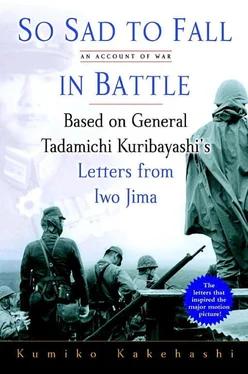In the afterword to his book Senshi no Isho ( Final Messages of Fighting Men ), Handô Kazutoshi provides an example. It is the final message that naval ensign Yoshida Mitsuru, who served on the batttleship Yamato and survived its sinking, wrote to his parents: “Please throw away everything that belongs to me. My only concern is that you all enjoy good health and live a long time.”
Handô Kazutoshi was curious about the deep love Yoshida had for his parents and the various anxieties that lay beneath the surface of his austere final message, and he quotes a passage from Senkan Yamato no Saigo ( The End of the Battleship Yamato), an account that Yoshida wrote after the war in which he reveals what his real feelings at the time were:
What can I do about my mother’s grief? Is there any way that I, doomed thus to die before her, can console my mother in her sorrow? Mother shall be left behind to bear the burden of grief in my place, and I have no way of thanking her for my life, the gift of her motherly love.
Stop. Pull yourself together now. I am a warrior going to war. For me, the battle is everything. I must not think of my mother, her head bent in grief.
Yoshida, however, did not mention the feelings that were tearing him apart in his final message. His message was short and formal—as was thought proper for a Japanese fighting man.
Handô’s book also includes the final message of Fleet Admiral Yamamoto Isoroku. It was found in his desk after his death with the inscription “Disposing of my Possessions.”
1. There is a danger of secrets leaking out, so please deliver all my books, documents, and letters to the place that Lieutenant General Horie, class group head, designates.
2. From the rest of my baggage (there is one piece in Kuresuikôsha), any presents which I received in wartime can be handed over [two ideograms in the original are illegible at this point] to be disposed of.
The message is terse to the point of being cold and brusque. This, presumably, represents the values of the Imperial warrior carried to their extreme.
Set beside final messages like those of Yamamoto and Yoshida, Kuribayashi’s is very everyday, very family-oriented—even slightly effeminate for a military man of that time. That, however, is precisely what drew me to him. I found myself wanting to learn more about this unusual commander.
I researched his family and discovered that Kuribayashi’s son, Tarô, was alive and well and living in Akishima in Tokyo. It was the autumn of 2003 when I visited him in his house in a quiet residential area.
It was an old detached house. The living room was not big and it felt cozy. The sliding doors leading to the Japanese-style room next door were open, and above the carved lintel hung a photograph of Lieutenant General Kuribayashi in uniform.
Tarô was seventy-nine years old. Tall and lanky, he somehow managed to squeeze himself into an easy chair, but every time his old cat scratched on the door leading to the corridor, he would get to his feet and open it. There was nothing in his gentle, slow way of speaking or his benevolent, slightly drooping appearance to suggest that he was the son of a “military hero.”
Tarô had been a student in Waseda University’s Department of Science and Engineering when Kuribayashi left for Iwo Jima. His major was architecture, and after the war he had practiced as a First-class Architect. Kuribayashi did not send his son to military preparatory school—something high-ranking soldiers tended to do—nor did he recommend that Tarô take the entrance exam for the Military Academy. According to Tarô, his father never told him he should become a soldier.
On the table lay a thick binder that Tarô had gotten out for my visit. “Go ahead,” he urged me, and I had a look inside. Sheets of yellowing writing paper were neatly filed in order. These were the letters from Iwo Jima.
The paper was probably military issue. There was a space to write the date and the page number, and “Kuribayashi Tadamichi” was printed on the bottom left. The paper was yellowing with age, but the finely penciled characters were so dark that they looked as though they had been written only recently.
The characters were crammed in tightly, with three lines of text to every two printed columns, and, possibly in order to save paper, all the letters had writing on both sides of the page.
The sheer number of letters took me by surprise. In the roughly eight months Kuribayashi was in Iwo Jima before the Americans made their landing, he sent a total of forty-one letters home, if you include the letters to his children. And the letter in which he had expressed his regret at not dealing with the draft in the kitchen turned out not to be his last letter after all.
AS I READ KURIBAYASHI’S letters in chronological order, I realized that they all started with an assurance of his safety.
“Skipping all the opening formalities, I am hale and hearty as ever, so there’s no need to worry about me;” “I am robust and working away, so there’s no need to worry about me;” “I am really very well, so there’s no need to worry about me;” “I am still safe and sound, so there’s no need to worry about me.” Given the circumstances he was in, Kuribayashi clearly felt that his still being alive was the most important fact for him to get across to his family. The first sentence of every opening paragraph invariably concludes with the phrase: “There’s no need to worry about me.”
It seems that he continued to worry about the “draft in the kitchen.” The following passage occurs in a letter he wrote to Yoshii on November 28, 1944, five months after the previously cited one:
You haven’t mentioned it since then, but did you block the crack in the kitchen floor?
Everyone was always complaining about how cold the draft that blew up through the floor was, so I meant to do something about it. I ended up going to the front without having done anything, which is weighing on my mind. Why don’t you get Tarô to fix it right away?
While you’re waiting for him to get round to it, either double fold some old thin matting and spread that over the crack, or cut some roofing paper (there’s a bit left over from the air-raid shelter in the storeroom) to the right size and put that down. I suspect the roofing paper will probably not last all that long.
“If you do get Tarô to do the job,” continues the letter, “I think he ought to do it as in my diagram” and Kuribayashi has added illustrations to explain the best way to stop the draft. The two diagrams, one from above and one from the side, with red pencil marks to indicate the places where the nails should go, make clear just how concerned Kuribayashi was about his family back at home.
On September 4, 1944, he had written:
I am sure you gave Takako some pocket money. [Takako was evacuated to her mother’s village in the country.]
Did you remember to give her envelopes, writing paper, and stamps so she can write to you? Not to mention toilet paper, toothpaste, and other everyday necessities….
On November 17, 1944:
Since we’re talking about baths, you really ought to heat one up about every five days or so. Since there are so few of you using it, you can reheat the same water two nights in a row.
This is what you should do if you do use the same water two daysrunning. When you get out of the bath the first night, stick your arm right down into the water and swirl it round in one direction so that the water spins around like a top. Now throw the washbowl in. It will spin round and round in the water then sink to the bottom, but as it sinks it mysteriously picks up all the dirt and gunk. (Take the washbowl out of the water the morning after.) Give it a go.
Читать дальше












